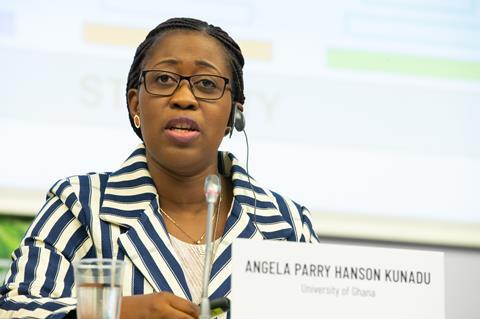Food safety has a great impact on public health, food and nutrition security and international trade competitiveness. With the emergence and re-emergence of infectious foodborne diseases, it has become increasingly important to control foodborne pathogens and their toxins, and other foodborne hazards that can result in life-threatening foodborne diseases with related economic losses.
One of the myriad challenges affecting food control in Ghana, and many developing countries, is the lack of data to justify the need for intervention and prioritisation. Regardless, everyone has a role to play to ensure the safety of the foods we produce, process, prepare and patronise.
Promoted: AMI has teamed up with QIAGEN to help you get the highest yields from your soil DNA Extractions. Get your free guide here.
My role and organisation
My role is to gather and interpret data on microbiological safety of food and use that data along with established principles to educate, train and conscientise students, stakeholders and the general public on the risks associated with exposure to foodborne hazards, what we should do to control them, and the need for each one to play their role effectively.
I am a Senior Lecturer in the Department of Nutrition and Food Science with a specialisation in Food Microbiology and Safety. My department has a vibrant turnout of students, averaging 200 students per year at the undergraduate level and about 30 to 40 postgraduate students per year. My core duties are threefold: teaching, research and extension. Teaching involves curriculum development, populating and updating course materials for each of the 11 courses I teach, including laboratory sessions, tutorials, assessments and delivering these in classrooms and workshops at both undergraduate and postgraduate levels. Being the quiet and generally shy person that I am, public speaking does not come naturally to me so I prepare and psyche myself for excellent delivery of lectures. It requires a lot of work and it can be stressful. I also mentor students by giving guidance in their academic journey to help them fulfil the requirements of their degrees.
My research mandate includes grantsmanship, lab and field research, and student project supervision at Honours, Masters and PhD levels. I have weekly research meetings with students and regular lab visits to ensure that students receive guidance in meeting their research objectives. My extension activities include volunteering my time and expertise on several committees, technical meetings, workshops, and public engagements. For example, I am a member of Codex Sub-Committee on Food Hygiene in Ghana, Technical Committees for development of Microbiological Criteria and other dairy standards in Ghana, and the Technical Committee for Dairy at the African Organisation for Standardisation.

Common pitfalls experienced in such roles
Microbiology research is not cheap. Moreover it is twice or three times as expensive to conduct such research in Ghana compared to other developed countries, as all consumables are imported, and they incur high import tax and value-added tax, making it difficult to conduct good-quality research and compete favourably at the international scale. The same challenges apply to analytical and precision equipment required for microbiological and molecular research; these are difficult to acquire and maintain. Moreover, local funding is woefully deficient, so we have to compete with international funding.
Most rewarding aspects of my work
It gives me joy to see graduates blossom in their academic and career journeys, and to see my research output at work in industry or considered in policy formulation or to be given a voice at high-level international meetings.
Securing funding for my research
I put in proposals in response to requests for applications that are widely publicised through databases. Some agencies send requests for proposals to their mailing list. Other times, collaborators from partner institutions send invitations for collaboration on proposals. Other small research projects are self-funded. I run a commercial microbiology testing laboratory in my department, and we use some of the proceeds to support some unfunded student research.
Which skills are most useful to me?
Scientific writing and proposal-writing skills. While 70% of my workload is dedicated to teaching, academic promotions are mainly through research activities, i.e. ability to win grants to conduct state-of-the-art research, and the ability to communicate that research through high-impact peer-reviewed journals and on other international platforms.
How can such skills be acquired/developed?
There are many free workshop opportunities for training in scientific writing and proposal writing for early career scientists within my institution, and across many international platforms, especially academic NGOs and career development agencies. Having a good mentor is also useful. I have learned a lot from seasoned scientists by co-publishing with them. It is still a learning curve for me; reviewing manuscripts and reading publications give me new ideas on how to improve my writing skills and communicate more effectively.
What I wish I had known earlier
Networking is extremely important in an academic/research career. It can potentially propel your career journey and expose you to opportunities that would not have otherwise been within reach. If I had known this earlier, I would have been more deliberate in my networking efforts and purposeful in nurturing my networks.
Further reading
Elsevier has a number of blogs that give good advice to Early Career Researchers or Academics: https://scientific-publishing.webshop.elsevier.com/manuscript-preparation/challenges-early-career-researchers/
World Health Organization “Golden Rules” for Safe Food Preparation: https://www.paho.org/en/health-emergencies/who-golden-rules-safe-food-preparation
Asuming-Bediako N, Parry-Hanson Kunadu A, Jordan D, Abraham S, Habib I. Prevalence and antimicrobial susceptibility pattern of Campylobacter jejuni in raw retail chicken meat in Metropolitan Accra, Ghana. International Journal of Food Microbiology 2022: 376, 109760. https://doi.org/10.1016/j.ijfoodmicro.2022.109760
Parry-Hanson Kunadu A, Otwey RY, Mosi L. Microbiological quality and Salmonella prevalence, serovars distribution and antimicrobial resistance associated with informal raw chicken processing in Accra, Ghana. Food Control 2020: 118, 107440. https://doi.org/10.1016/j.foodcont.2020.107440







No comments yet